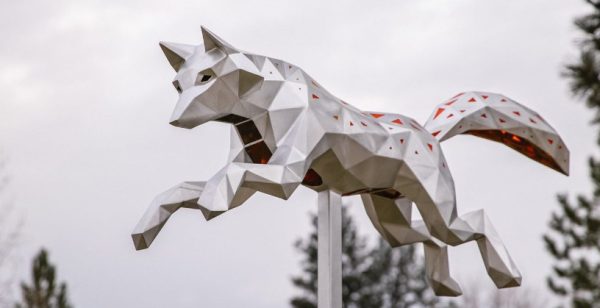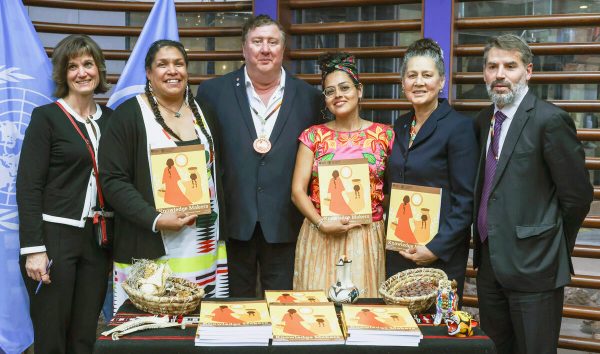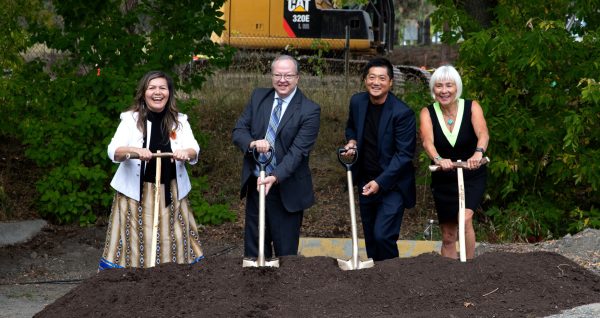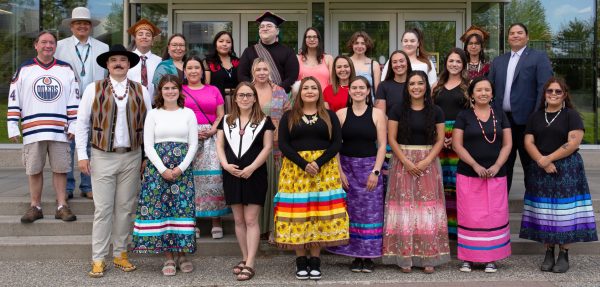As Canada continues its reconciliation journey, significant strides are being made to address the educational disparities faced by Indigenous youth. The nation is witnessing a groundswell of support aimed at fulfilling the mandates set forth by the Truth and Reconciliation Commission of Canada (TRC), particularly within the education sector—one of the most critical pathways to empowerment and socio-economic development.
In acknowledgment of a decade of efforts dedicated to addressing these challenges, the Mastercard Foundation is committing $235 million to 30 organizations that are advancing post-secondary education for Indigenous youth across Canada.

December 19, 2024: Four striking xgwélemc (fox) sculptures grace the TRU Kamloops campus. Inspired by a Secwépemc Stsptekwl, a traditional story or legend, the sculptures were created by celebrated local Indigenous artist and alumni award recipient Bill Frymire.
Among the beneficiaries announced on Sept. 9, Thompson Rivers University (TRU) has secured a transformative $5 million from the Mastercard Foundation’s EleV Program, recognizing the university’s innovative and impactful initiatives for Indigenous youth. This strategic partnership aims to enhance educational opportunities for Indigenous students in Canada and foster collaborations with local communities, aligning with the Mastercard Foundation’s commitment to transformative education.
TRU President and Vice-Chancellor Dr. Airini says the university is deeply committed to integrating Secwepemctsín educational principles into its curriculum, acknowledging the critical role Indigenous knowledge plays in reconciliation efforts. In accordance with the TRC’s Calls to Action, TRU is committed to seeking guidance and collaboration from Indigenous leaders and communities to develop projects that reflect these values. This initiative underscores TRU’s commitment to building an educational environment that not only embraces cultural inclusivity but also deeply honours the traditions and heritage of the Secwépemc people.
“Thompson Rivers University is honoured and humbled to be among the organizations recognized through this bold investment by the Mastercard Foundation,” says Airini. “We’re on a journey to living reconciliation fully and seek to be respectful in all ways. We recognize those who went before us, forging the way for reconciliation to begin and for this work we do at TRU. We are mindful of our continued responsibilities to the lands and peoples we serve, and those yet to be born. We are making strides forward.
“This unexpected and exceptionally generous gift is accepted with deep appreciation and as a responsibility. The possibilities are significant. If we remain focused and open, look after relationships that have been broken, and continue to innovate in research and education, we will grow as a university willing to be all that we have been called to be as partners in reconciliation.
“We will seek to further strengthen work with students and communities across Secwepemcúl’ecw and beyond, helping to advance educational and research opportunities where Indigenous knowledge, values and leadership are equal. By accepting this gift, we undertake to advance language revitalization, education and research initiatives that support the next generation of Indigenous learners and knowledge makers at TRU. We are inspired to build stronger futures for all, together, through the power of education and research.”
Impactful Indigenous initiatives

March 7, 2025 (left to right): TRU Vice-President Research Shannon Wagner; Melanie Kirby of Tortugas Pueblo, New Mexico, US; TRU Director of All My Relations Research Centre Rod McCormick; Rosa Marina Flores Cruz of the Afro-Binniza, Isthmus of Tehuantepec, Mexico; Knowledge Makers Program co-founder Airini; and FAO Head of Indigenous Peoples Unit Yon Fernandez de Larrinoa at the launch in Rome, Italy of the Knowledge Makers Special Edition – Indigenous Women, Indigenous Peoples’ Food and Knowledge Systems and Climate Action.
The Knowledge Makers Program at TRU is a groundbreaking initiative designed for Indigenous students to learn how to conduct research and publish their findings as Indigenous scholars. Each year, the program selects up to 15 Indigenous undergraduates from various faculties to engage in a multifaceted learning experience that empowers them to create and disseminate knowledge.
Since its establishment in 2016, with guidance from Jeneen Herns-Jensen, associate director, and Rod McCormick, director of the All My Relations Research Centre and BC Innovation Chair in Indigenous Health, the program has seen remarkable advancements. Students from over 82 Indigenous communities and Nations have successfully published their work in peer-reviewed journals through the Knowledge Makers Journal. Notably, a global edition of the journal, featuring the research of 21 Indigenous women from 16 countries, was launched as a publication by the Food and Agriculture Organization of the United Nations in Rome earlier this year.
Alumni of the Knowledge Makers Program have achieved significant milestones, including winning two national scholarships, securing a SSHRC research grant of $50,000 and engaging in various research and academic endeavours, including international internships and conference presentations. The program nurtures academic and professional development across all educational levels and has facilitated the establishment of an international network involving Canada, the United States, Mexico, New Zealand and Australia.
“The All My Relations Research Centre and the Knowledge Makers Program have taken the stand that solutions to the many problems affecting Indigenous communities must come from Indigenous Peoples,” says McCormick, who is a member of the Mohawk (Kanien’keha’ka) First Nation. “We understand our communities and are learning how to use research to serve our communities to help address these problems.
“This generous gift from the Mastercard Foundation will enable many other Indigenous students and community members to receive training and support in conducting research. The time is ending for research conducted on our behalf or about us; it’s now our turn to conduct research ourselves. A big Kukwstsétsemc and Niá:wen to the MasterCard Foundation for helping us continue this transformative work.”

Officials from left to right: Kúkpi7 Rosanne Casimir, Tk’emlúps te Secwépemc Chief, TRU President Brett Fairbairn, TRU Board Chair Hee Young Chung, and TRU Chancellor DeDe DeRose pose for a photo at the groundbreaking ceremony for the new Indigenous Education Centre at TRU on Thurs., Sept. 19, 2024. Casimir and DeRose are using pétse, traditional digging sticks, created by Secwépemc artist Ed Jensen.
The Indigenous Centre (IC) at TRU further exemplifies this commitment. Currently under construction, it represents a $22-million investment in Indigenous education and reconciliation, developed in partnership with Tk’emlúps te Secwépemc and led by Indigenous architect Patrick Stewart.
The IC will feature a community gathering space inspired by Secwépemc summer lodges, outdoor classrooms integrating natural elements and dedicated areas for Elders, ceremonial activities and Indigenous research.
Slated for completion in 2026, the innovative design and construction of the centre reflect TRU’s dedication to creating a culturally inclusive environment and advancing reconciliation efforts.
Coinciding with these efforts, TRU’s Coyote Project is a transformative Indigenization initiative aimed at creating a more inclusive, diverse and respectful academic environment for students, staff, faculty and surrounding communities.
Launched in 2017, this university-wide effort focuses on enhancing Indigenization to improve the recruitment, retention and success of Indigenous students and includes participants from TRU’s nine academic faculties and schools, as well as the TRU Library, Open Learning and TRU World.
Through the Coyote Project, the university has taken a focused approach to decolonization and Indigenization, addressing the Truth and Reconciliation Commission’s 94 Calls to Action and aligning with the United Nations Declaration on the Rights of Indigenous Peoples.
Collaboration and understanding

TRU 2025 Indigenous graduates (Photo credit: Destiny van Oirschot, Morning Breeze Photography)
TRU prioritizes creating strong and enduring partnerships with Indigenous communities, recognizing the critical role these relationships play in fostering mutual understanding and growth.
By engaging in partnerships, educational agreements and memoranda of understanding with Indigenous communities, TRU actively supports initiatives that not only celebrate but also deeply integrate Indigenous cultures into the university’s academic and cultural fabric.
This commitment signals TRU’s proactive approach to meeting the unique learning needs of Indigenous communities, ensuring their voices and perspectives are woven into the educational experience.
The success of these partnerships has broader implications, setting a precedent for how universities can engage with Indigenous communities in meaningful ways that promote cultural preservation, educational equity and mutual respect.

